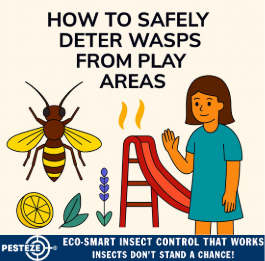HOW TO SAFELY DETER WASPS FROM PLAY AREAS

HOW TO SAFELY DETER WASPS FROM PLAY AREAS
SUMMARY
Wasps around children’s play areas can quickly turn outdoor fun into a safety concern. Because wasps can sting when threatened, it’s important to deter them without using harsh chemicals that could harm kids or pets. With safe, natural methods and smart maintenance, you can keep play areas free of wasps and enjoyable for the whole family.
FEATURES
-
Keep Food and Drinks Away – Store snacks indoors or in sealed containers to avoid attracting wasps.
-
Use Child-Safe Natural Repellents – Peppermint oil sprays, citronella, and cloves deter wasps safely.
-
Set Up Decoy Nests – Hanging fake nests keeps wasps from establishing colonies nearby.
-
Remove Potential Nests Early – Inspect play structures, swings, and roof edges for small nest beginnings.
-
Maintain a Clean Yard – Clear fallen fruit, trash, and debris that attract wasps.
-
Place Wasp Traps Away from Play Areas – Position sugar water or vinegar traps far from where kids play.
GUIDE DESCRIPTION
Children’s play areas should be safe havens for fun and exploration—not buzzing grounds for wasps. Since wasps are naturally attracted to food, sweet drinks, and sheltered areas for nesting, these pests can easily invade playgrounds or backyard swing sets. The good news is you can deter wasps safely with preventive measures and natural solutions.
The first rule is to keep food and drinks away from play zones. Sugary snacks, juice boxes, or even sticky residues from spills can attract wasps quickly. If kids eat outdoors, make sure food is sealed and trash is disposed of immediately in covered bins placed away from play areas.
For added protection, use child-safe natural repellents. Peppermint oil, citronella, and cloves are scents that wasps dislike. A diluted peppermint spray applied around play structures or citronella candles placed nearby (but out of children’s reach) can deter wasps without harmful chemicals.
Another powerful tool is decoy nests. Since wasps are territorial, they usually avoid building near another colony. Hanging artificial nests around the yard or near the perimeter of play areas can discourage them from moving in.
Regular inspections are crucial. Check play structures, swings, and roof edges for early signs of nest building, especially in spring and summer. Removing small starter nests with a broom (when no wasps are present) prevents larger colonies from forming.
Yard maintenance also plays a big role. Remove fallen fruit, trash, and debris, which serve as food sources for wasps. Keeping the lawn tidy not only looks great but also minimizes the chances of wasps hanging around.
Finally, set up traps at a safe distance. A simple mixture of sugar water or vinegar in a container will attract and trap wasps, but place them far from play zones so wasps are lured away instead of toward children.
By combining cleanliness, repellents, deterrents, and smart placement of traps, you can safely deter wasps from play areas and give your children a secure space to enjoy the outdoors without worry.
- Shashank Rongali


Comments 0